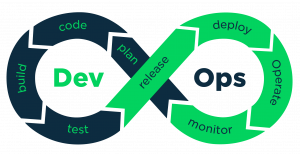DevOps: Hot Skills, Tools, and Certifications
 We live in the age where almost every business or firm has a software branch. This could be an outcome of the world becoming so technically advanced that the global population using smartphones was found to be around 2.1 billion in 2016. This creates a whole new medium through which almost every company can engage the masses.
We live in the age where almost every business or firm has a software branch. This could be an outcome of the world becoming so technically advanced that the global population using smartphones was found to be around 2.1 billion in 2016. This creates a whole new medium through which almost every company can engage the masses.
Now, due to the need of up to date software attributes and so much competition in the market, a very high skill of software development is required. This led to an exponential trend data science. A massive amount of resources and effort is put into development departments of companies.
Along with the development sector, another area has risen in recent years due to the realization of its importance. This is the operations department which constantly strives for the optimization of almost every operation occurring in the company. Along with processes, this sector works to maximize profits or minimize resources.
What is DevOps?
DevOps = development + operations
DevOps is a group of practices automates the process between an IT team and a software development which ensures faster delivery of reliable softwares. DevOps foundation relies upon a collaboration culture.
DevOps offers a variety of benefits such as increased trust, flexibility, fast and reliable software releases, better understanding of complex situations and their solutions and better planned work. So essentially DevOps can be considered as a culture or a movement of sorts. The main DevOps emphasis is to changes people’s thinking to bring collaboration and integration in operations and development. By uniting agile, continuous improvement, higher automation it will help develop more efficient development and operations that will bring in innovation and provide faster delivery, delivering higher worth to your business and customers.
How and when did DevOps appear?
 The DevOps appeared in 2007-2008, during the time when software development networks and IT operations became more worried and expressed their concerns about a vital level of industry dysfunction. They united against the old conventional model of software development, in which those who used to write a code were functionally and organizationally separated from those who evolve this code.
The DevOps appeared in 2007-2008, during the time when software development networks and IT operations became more worried and expressed their concerns about a vital level of industry dysfunction. They united against the old conventional model of software development, in which those who used to write a code were functionally and organizationally separated from those who evolve this code.
IT professionals and developers had different goals, individual leadership characteristics, separate key performance indicators (KPIs), and even worked on different floors or buildings. As a result, there were different, independent teams associated only with their goals, unsuccessful releases and unsatisfied customers.
But later they found a great way to cooperate. These two separate sectors united and appealed to such professionals as John Willis, Gene Kim and Patrick Dubois.
Why is DevOps a mainstream now?
Nowadays, DevOps is becoming increasingly popular. This has become a very famous practice among IT professionals and software developers. DevOps differs from the old working model by emphasizing the significance of communication, coordination between departments and team-based collaboration. These are the reasons why DevOps is becoming so popular:
- Greater security
- Higher market speed
- Increased number of conversions
- Increased Customer satisfaction
- Environment stability and better working environment
- Time availability
- Steady software delivery
DevOps is also perceived as a movement, culture, and practice which emphasizes on communication and collaboration of Information Technology or IT experts and software developers while both work for the automation of software delivery process as well as infrastructure changes in the Industry. DevOps aims to establish an environment and culture where testing, building and releasing a software can occur more frequently and rapidly.
Which DevOps tools should you know?
The narrow meaning of DevOps describes a specific part of the IT team of a certain organization which creates and then maintains infrastructure. This term can also be used to describe a team of software engineers strategically searching for a complete chain of software delivery maintaining the shared services and mastering the utilization of development tools.
The Different subcategories of DevOps
DevOps is now rapidly becoming a buzzword of sorts, and many organizations and individuals all over the world are talking about it. DevOps is not a tool, innovative framework or technology, it is more of a concept or philosophy. DevOps is found to include different subcategories like:
– Continuous Integration
This is about the culture of amalgamating a source code or an application code to source code repositories. Building tools are utilized to verify or check in by incorporating the source code repositories and continuous tools for integration.
– Continuous Testing
Unit testing is utilized for such type of automated testing, and these tools are then properly amalgamated in continuous integration behavior through tools.
– Cloud Provisioning/Continuous Provisioning
Cloud instance or virtual machines are very flexible and highly available with the pay per use feature. It is also very beneficial to make different forms of instances for versatile environments such as staging, production, testing, and development.
– Configuration Management
This concept is useful especially when it comes to making runtime environment entirely ready in a more consistent manner all across the environment. Numerous configuration management tools can be utilized to manage given resources easily.
– Continuous Deployment or Delivery
Continuous deployment or continuous delivery is a term commonly used every day. Continuous delivery is used when the package file is ready for deployment to any environment while continuous deployment, on the other hand, is the term used when the specific file is production deployment ready.
Many companies and individuals are now using DevOps for various reasons. Those that regularly practice DevOps have found out many benefits which include short market time, far greater product quality, more client satisfaction, more reliable releases, increased efficiency and more. The benefits also include building the right products through fast experimentation. Though individuals and companies have different stands and personal views about DevOps, no one can deny the unique sets of benefits it brings.
Which certifications are required for DevOps?
The AWS Certified DevOps Engineer – Professional exam approves specialized expertise in provisioning, working, and overseeing distributes application frameworks on the AWS stage. The exam concepts you should understand for this test include the ability to:
- Implement and manage reliable delivery and methodologies
- Understand, implement, and automate security controls, administration procedures, and consistence approval
- Define and implement monitoring, measurements, and logging frameworks on AWS
- Implement highly available, scalable and self-healing systems on the AWS platform
- Device, manage and maintain tolls to automate operation systems
Will DevOps be in demand in 10 years?
 We have seen that in recent years the concept or idea of DevOps has undergone quite a rise and is now becoming a part of our everyday lives. Still, a very concerning question arises that will DevOps be in demand after 10 years or will it wither away like many other ideas. Now as you have seen DevOps is not just simply an idea or a set of ideas, It is a culture, a philosophy of work and as it has grown we have found out that DevOps has enabled countless software firms to increase their productivity, the number of satisfied customers and all in all their profits by an exponential rate.
We have seen that in recent years the concept or idea of DevOps has undergone quite a rise and is now becoming a part of our everyday lives. Still, a very concerning question arises that will DevOps be in demand after 10 years or will it wither away like many other ideas. Now as you have seen DevOps is not just simply an idea or a set of ideas, It is a culture, a philosophy of work and as it has grown we have found out that DevOps has enabled countless software firms to increase their productivity, the number of satisfied customers and all in all their profits by an exponential rate.
Last research has shown that the most prestigious IT organizations develop the codes 25-30 times more often using DevOps methods, and this number have been predicted to increase for at least 10 years in the future. As you have seen DevOps is not just a procedure, it’s a change in mindset, and through this mindset, we have seen that productivity along with profits and satisfied customers has increased over time.
There are many other statistics that can support this argument for example, Research conducted by DevOps Summit UK in 2015 shows that 30% of 300 organizations are either going to implement DevOps into their systems or have done so, whereas, 13% are planning to follow in their footsteps. These statistics and reasons are more than enough to answer the question that will DevOps be still in demand after 10 years or not.
What are the advantages of DevOps?
Organizations that use DevOps methods in their systems simplify their work. DevOps incorporated cross functioning teams into their systems that all work together to ensure the system delivers maximum speed, flexibility and innovation.
DevOps technical benefits include:
- Continuous improvement in software delivery
- Simplicity in managing software
- Faster solution of problems
- DevOps cultural benefits include:
- Happier, more efficient team
- Higher employee productivity
- Career development opportunities
- DevOps business benefits include:
- High speed delivery of innovative features
- Smoother operations
- Enhanced communication
- More innovation rather than firefighting
Organizations that have not employed DevOps into their system face difficulties in introducing new features and the stability of these features. The development team is accountable for the features and the operations team for stability and both teams are measure on how effectively they deliver on their performance.
However, organizations that have integrated DevOps in their systems have cross-functional teams where everyone in responsible for delivery promised stability. Teams have a single goal and together through full collaboration, test-based techniques and automation, they are able to solve problems in application of system, infrastructure and its configuration. Development and operations simultaneously work together to solve problems. Not only does it solve problems in a timely manner but it also saves time and cost for your business.
Conclusion
So we have shown to you what DevOps is at a more core level. While there are numerous definitions of DevOps, we have shown you the core idea behind it and what essentially DevOps stand for and what are the results and benefits of implementing DevOps to your firm or even your daily life. The statistics mentioned earlier also show that the idea DevOps will keep on rising for the next few years justifying the statement that DevOps could be the future for the development of information technology firms.

 Top 12 Cloud Certifications in 2018
Top 12 Cloud Certifications in 2018
 Top Career Opportunities for Financia...
Top Career Opportunities for Financia...
 Top 6 Agile Certifications in 2018
Top 6 Agile Certifications in 2018
 Top Free Digital Marketing Certificat...
Top Free Digital Marketing Certificat...
You must be logged in to post a comment.